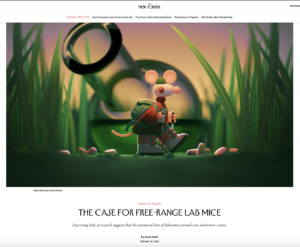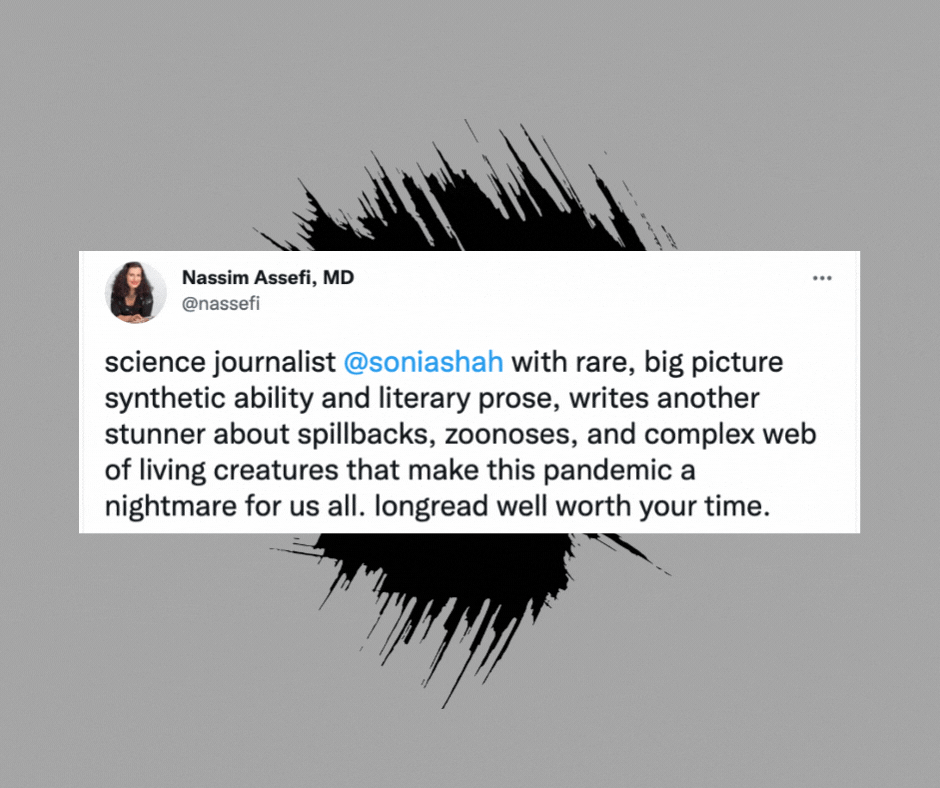My opinion piece on the FDA’s scrapping of the Declaration of Helsinki, and with it adequate protection for the human rights and safety of clinical trials subjects in the developing world, appeared in The Nation online a couple weeks ago. Check it out here.
Category: The Body Hunters (Page 2 of 4)
Late last month, a small notice in the Federal Register announced that after more than thirty years, the FDA will summarily excise the World Medical Association’s “Declaration of Helsinki,” the internationally recognized gold-standard for principles of ethical medical research, from its codes. It’s a shocking departure, and one that has hardly made a dent in the mainstream media. Here’s a guest blog I wrote about it for the national consumer rights group Prescription Access Litigation:
There have been seven foreign language translations of both CRUDE and THE BODY HUNTERS, but until now, none of my books has been available in Spanish. Now, at long last, 451 Editores will be publishing a Spanish edition of The Body Hunters, translated by Ricardo García. I’m not sure when the publication date is, but Ricardo recently sent me some very thoughtful queries about the book, so I expect a wonderful translation. Updates to follow.
The sixth foreign-language translation of CRUDE will be released this week. The Dutch version is called “Ongeraffineerd,” which I love for being so very much longer than the English version.
Apparently, there’s been a lot of interest in the book in Holland. A magazine called Greenpeace Krant, with a circulation of 500,000, is featuring the book, and the Dutch equivalent of the Financial Times (Financieele Dagblad) will, too. I wrote a new chapter for this edition, focusing on Holland’s fascinating petro-history. I’m looking forward to a flood of provocative feedback from Dutch readers. Stay tuned for more.
Today’s Calcutta Telegraph carried a nice review/summary of The Body Hunters, published in India by Pearson. I’m thrilled that the Indian press is covering the book, since I did much of my reporting from India, where there is a real problem with unethical clinical trials. Check it out at: http://www.telegraphindia.com/1080328/jsp/opinion/story_9059631.js
I’m thrilled to report that the Body Hunters has been translated into six languages, besides English (Japanese, Italian, French, German, Portuguese, Korean.) The French edition, in particular, appears to be making a splash. It’s been selected a “book of the month” by a prominent popular science magazine, and was covered in the French version of Time magazine, “Le Nouvel Observateur,” along with coverage in the dailies and national radio.
I find this interesting, given that the French actually have some of the very best laws protecting clinical trial subjects in the world. Could reader interest in this topic be viewed as some version of rubbernecking? Perhaps so.
Inhaled insulin: Here’s a great illustration of how disconnected the drug industry has become from public health….or even individual peoples’ health. When I went to a industry conference a few years back, Pfizer execs were gloating over their great new experimental product, a form of inhaled insulin. The drug was still in clinical trials–meaning they couldn’t have known whether it was truly safe and effective or whether it was any better than injected insulin–but they were certain that it would be a blockbuster. Because, of course, whether the drug was effective or any better than what we already have was irrelevant. Inhaled insulin is a great idea, in principle, and the obvious plan was to harangue patients with marketing so they’d switch to it on that basis alone.
Well, Pfizer’s drug, Exubera, was a bust. They “only” sold $12 million worth of it, and so now they are going to stop selling it! First it was the best thing since sliced bread, but now…since they aren’t making the billions they foresaw, they’re dumping it. So much for those users who did switch and actually liked it. They’re screwed.
Basically, the drug was a bust because it was no better than injected insulin and on top of that, it messed up patients’ lungs. A total disaster.
Now, a new company called Mannkind, backed by a billionaire investor, is launching a new inhaled insulin called Technosphere Insulin, similarly gloating–while the drug is still in clinical trials–that they will make billions on the thing. The New York Times business section featured their glossy PR in an article this morning, replete with a large pic of the billionaire investor looking smug in his grand digs. He might as well have had dollar signs tattooed on his eyeballs.
Buried near the end of the story we learn that–already!–more patients taking the inhaled insulin have dropped out of clinical trials than patients taking the old standby, injected insulin! “For reasons that are not yet clear”! Well, there can’t be any reason, in my mind, that doesn’t bode poorly for the inhaled insulin. They didn’t like it, they had adverse effects, or whatever.
And, the chief medical officer has accused the company of hiding information about the drug from the FDA! The company, in response, fired him. But we’ll never learn about the dirt he found because his wrongful termination suit has been settled out of court!
This thing seriously stinks. And it is all the more remarkable for the fact that all of this dirty laundry about the drug is tucked into what is overall a glowing business story.
Check it out: http://www.nytimes.com/2007/11/16/business/16mannkind.html?_r=1&oref=slogin
Will the Nigerian charges against Pfizer change how drug companies conduct clinical trials in developing countries? I don’t think so. The Nigerian authorities seem to be more interested in sensationalizing the charges and catering to their own disgruntled populace. (And can we really expect the Nigerian government and an American company to come clean about what happened during that mengingitis epidemic in 1996? Evidence suggests that the Nigerian authorities were complicit in some way, just as they’ve been complicit for decades in Western oil companies’ exploitation of their citizenry in the Niger delta.)
What’s really needed is greater transparency, but the Nigerian authorities are not asking for that. They’re asking for payback. The bad PR that Pfizer will inevitably get may very well make drug companies more secretive about their activities in poor countries–which will make clinical trials more dangerous for trial subjects everywhere.
Nigerian authorities have threatened to send Interpol to capture Pfizer staffers, after the nine Pfizer employees brought up on criminal charges in Nigeria failed to show up in court on Wednesday, after being served not just one but two summons.
“If they fail to appear in court” on November 6, the judge said, “we will have no option but to seek the help of Interpol in arresting them and bringing them to court.”
One suspects this is a ruse to appease a restive public–protests against Pfizer were in the works–while pumping up pressure to extract big dollars in a settlement. Out-of court talks to settle the case started in September, and are scheduled to resume on November 17…after the Pfizer folks stand trial.
The federal lawsuit against Pfizer was also adjourned, to October 22; and a final civil lawsuit was adjourned to December 5.
Stay tuned for more…
For years, the drug industry has been plagued with the problem of finding enough human subjects to take experimental drugs. Each new drug they develop requires about 4,000 patients in clinical trials, who must undergo some 141 separate medical procedures. Increasingly, Americans and Western Europeans are just not that interested. Eighty percent of clinical trials in the West fail to recruit sufficient numbers of subjects, stalling the pace of drug development—and bleeding drug companies of some $1 million each day their potential blockbuster remains locked up in R&D.
Since the late 1990s, drug companies have routed this dilemma by exporting their clinical trials for new drugs to developing countries, where the sick and desperate abound. Last year, GlaxoSmithKline, Wyeth and Merck conducted at least half of their clinical trials for new drugs outside the major markets of the United States and Western Europe. In poorer countries, recruitment is rapid. In South Africa, for example, leading clinical trials company Quintiles reports it recruited 3,000 trial subjects in 9 days, and over 1,300 pediatric subjects in 12 days.
Easy, fast access to lots of sick, untreated patients is what drew Pfizer to Nigeria, too, where no informed consent forms were signed and where no witnesses could attest to the verbal consent the company alleges took place. Pfizer’s lack of documentation may be unusual but there’s plenty of evidence to suggest that the quality of consent in developing countries is generally poor, even when the forms are filled out. In studies in Bangladesh and South Africa, up to 80 percent of subjects enrolled in trials reported that they were unaware that they were free to leave the trial—a clear violation of the standard of voluntary informed consent.
In the West, up to 45 percent of subjects drop out of trials, providing post-factum confirmation of their voluntary consent. Dropouts are disturbingly scarce in trials in poor countries. One New-Delhi-based clinical trials company boasts, in its promotional literature, that it retains “99.5 percent” of enrolled subjects. “Russian subjects don’t miss appointments….and only very rarely do they withdraw their consent,” enthused a typical promotional Applied Clinical Trials article, “Discover Russia for Clinical Research.” “What a phenomenon!”
Pfizer didn’t have to alert the FDA and allow the agency to scrutinize its protocol before its scientists jetted off to Nigeria. Neither the FDA nor its counterpart in Europe requires prior review of trials that are conducted beyond US and EU borders, as they do with domestic trials. In the case of Pfizer in Nigeria, the ethics committee “approval” that the company provided to the FDA—and which the agency silently accepted, in its approval of the drug—was later shown by journalists to have been backdated, because there was no ethics committee at the local hospital when the trial took place.
But the most alarming part about drug company experiments overseas is how very little we know about them. Most drug companies aren’t sued by foreign governments for their unethical clinical trials. Most clinical trials overseas never see the light of day: after all, about 90 percent of drugs that enter clinical trials fail to gain market approval. No scientific papers or newspaper stories are written about them. Our regulators don’t know about them. These failed experiments effectively vanish as soon as they close down.
But while we blithely pop our prescription pills, a generalized sense of exploitation at the hands of Western drug companies grows, from South Africa where antiretroviral drugs are condemned to Nigeria where the polio vaccine was rejected. Unless we start to get serious about regulating these trials, Pfizer’s troubles in Nigeria will only inflame it, with public health impacts for us all.
Over the past few decades, pharma companies have circumvented complaints that they overprice their drugs and ignore the ills of the poor with subsidized drugs and private-public partnerships to spur drug development. But charitable works will not shield them from charges that their conduct of clinical trials on the poor is shoddy. Pfizer, rather than ducking the charges against it, should lead the call for increased regulation of overseas trials—for its own benefit, as well as the rest of us.













